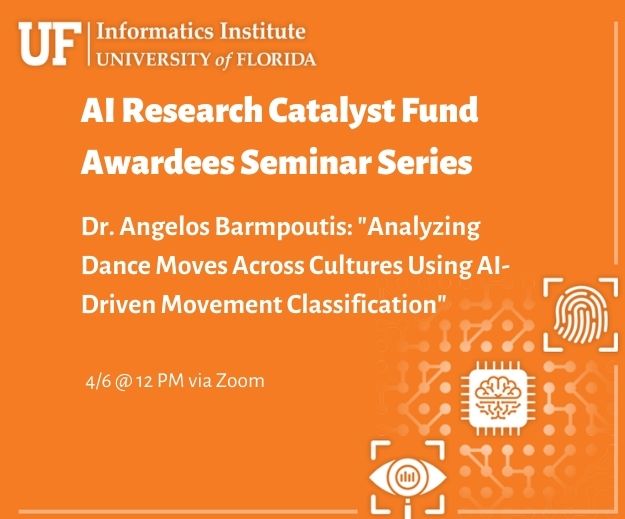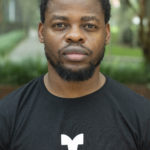AI Research Catalyst Fund Awardees Virtual Seminar Series – Dr. Angelos Barmpoutis

- This event has passed.
AI Research Catalyst Fund Awardees Virtual Seminar Series – Dr. Angelos Barmpoutis
April 6, 2022 @ 12:00 pm - 1:00 pm

AI Research Catalyst Fund Awardees Virtual Seminar Series
“Analyzing Dance Moves Across Cultures Using AI-Driven Movement Classification“
by Dr. Angelos Barmpoutis, Associate Professor in the On-Line Learning Institute and the Digital Worlds Institute
and Qudus Onikeku, Maker in Residence Research Assistant Professor
and Dr. Wenbin Guo, Post-Doctoral Associate in the On-Line Learning Institute and the Digital Worlds Institute
Wednesday, April 6, 2022
ABSTRACT:
An interdisciplinary team from the Digital Worlds Institute, the Center for Arts in Medicine, and the Center for the Arts, Migration, and Entrepreneurship proposes in this project to automate Laban analysis of human movement using artificial intelligence. Human movement has been studied in multiple disciplines, including health sciences (biomechanics, kinesiology, neurology, sports medicine) and the Arts (theater and dance, cultural studies) as well as their intersection (arts in medicine, dance therapy), resulting in a large but disparate assortment of multi-modal datasets, including video, skeletal motion capture, manual annotations, and clinical metadata. Traditional data collection processes often include Laban movement analysis, a standardized form of human movement annotation that parameterizes the observed motion changes in a pre-defined 4-dimensional feature space (effort, space, shape, body timing/phrasing). Such analysis requires lengthy manual input from professionals who annotate the recorded data through a time-consuming “watch and pause” process, which is also prone to human errors. In this project, we propose to use AI to fully automate the annotation process involved in Laban analysis by using deep learning algorithms on existing human motion datasets of video and skeletal sequences. The trained model will then be tested in Laban-annotating existing video and skeletal sequences and validated by arts in medicine practitioners and experts in Laban analysis. This AI-driven project will have a significant impact as it will enable automated classification and understanding of human motion across a spectrum of movement-centered disciplines, including clinical and telehealth settings, orthopedic centers, choreographic practice, and cross-cultural movement analysis.
Bio:

Angelos Barmpoutis is currently an Associate Professor in the On-Line Learning Institute and the Digital Worlds Institute at the University of Florida. He is also the coordinator of research and technology in the Digital Worlds Institute, and affiliate faculty of the Computer and Information Science and Engineering Department and the Biomedical Engineering Department, University of Florida. His current research projects focus on interdisciplinary applications of computer science and engineering to the service of the broad areas of learning and training. Prof. Barmpoutis areas of expertise include machine vision and applications, virtual reality in medicine and education, human motion capture and analysis using RGB-D cameras (such as Microsoft Kinect sensor), and image processing and visualization. Dr. Barmpoutis has coauthored numerous highly cited journal publications, conference articles and book chapters in the aforementioned topics, and has received several awards and grants from various funding agencies including the US National Endowment for the Humanities, the Andrew W. Mellon Foundation, the National Institutes of Health, and the US Department of Transportation. https://arts.ufl.edu/directory/profile/1805
Qudus Onikeku is a movement artiste made of diversity. Over the decade, he has established himself as one of the preeminent multitalented artistes, working today with different media: performance, research, installation, curating and community organizing. He is the artistic director of Nigeria’s preeminent creative organization, QDance Center Lagos, which operates as a creative incubator that applies artistic competence, human resources, innovation and creativity, as capacities for human centered content development. Qudus is currently the first “Maker in Residence” at The Center for Arts, Migration and Entrepreneurship of the University of Florida – 2019-2022. https://arts.ufl.edu/directory/profile/174521
Wenbin Guo is a Postdoc Associate at UF Digital Worlds Institute. He collaborates with an interdisciplinary team from Digital Worlds Institute, the Center of Arts in Medicine, and the Center for the Arts, Migration, and Entrepreneurship to automate analysis and annotation of human motion using artificial intelligence. He builds and runs deep learning algorithms on existing human datasets of video and skeletal sequences. He received his Ph.D. in Industrial Engineering along with a Master of Computer Science at the University of Missouri. As an independent researcher, much of his focus has been on AR/VR, human-computer interaction, healthcare, and machine learning. He developed an advanced location-based augmented reality learning environment. He was motivated to improve personnel performance in the healthcare system. He also developed a serverless conversational survey platform AI chatbot helping non-technical persons to build and deploy customized surveys using conversations. https://arts.ufl.edu/directory/profile/197503
video and skeletal sequences. He received his Ph.D. in Industrial Engineering along with a Master of Computer Science at the University of Missouri. As an independent researcher, much of his focus has been on AR/VR, human-computer interaction, healthcare, and machine learning. He developed an advanced location-based augmented reality learning environment. He was motivated to improve personnel performance in the healthcare system. He also developed a serverless conversational survey platform AI chatbot helping non-technical persons to build and deploy customized surveys using conversations. https://arts.ufl.edu/directory/profile/197503
Wednesday, April 6, 2022
12:00PM – 1:00PM
Via Zoom

